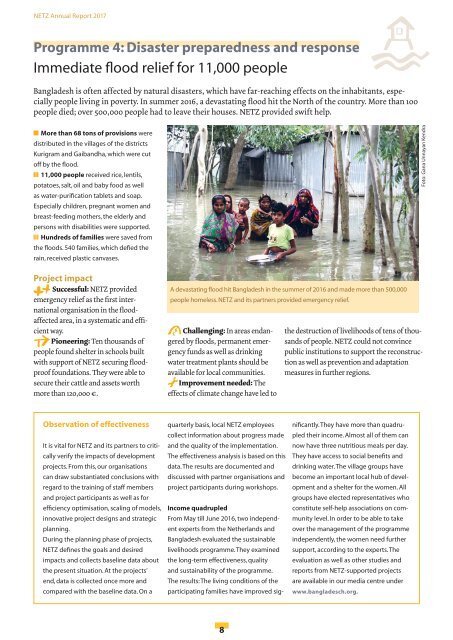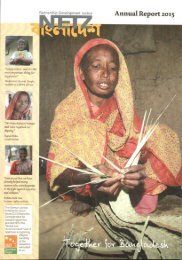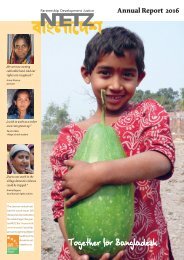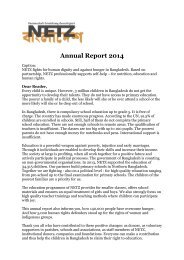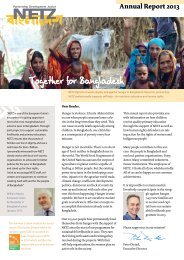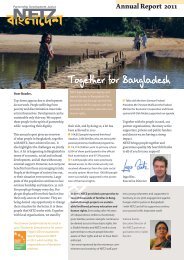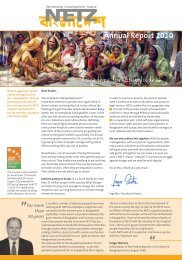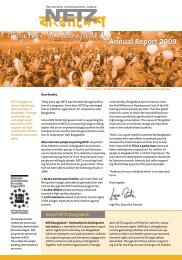NETZ Bangladesch Annual Report 2017
You also want an ePaper? Increase the reach of your titles
YUMPU automatically turns print PDFs into web optimized ePapers that Google loves.
<strong>NETZ</strong> <strong>Annual</strong> <strong>Report</strong> <strong>2017</strong><br />
Programme 4: Disaster preparedness and response<br />
Immediate flood relief for 11,000 people<br />
Bangladesh is often affected by natural disasters, which have far-reaching effects on the inhabitants, especially<br />
people living in poverty. In summer 2016, a devastating flood hit the North of the country. More than 100<br />
people died; over 500,000 people had to leave their houses. <strong>NETZ</strong> provided swift help.<br />
1 More than 68 tons of provisions were<br />
distributed in the villages of the districts<br />
Kurigram and Gaibandha, which were cut<br />
off by the flood.<br />
2 11,000 people received rice, lentils,<br />
potatoes, salt, oil and baby food as well<br />
as water-purification tablets and soap.<br />
Especially children, pregnant women and<br />
breast-feeding mothers, the elderly and<br />
persons with disabilities were supported.<br />
3 Hundreds of families were saved from<br />
the floods. 540 families, which defied the<br />
rain, received plastic canvases.<br />
Project impact<br />
Successful: <strong>NETZ</strong> provided<br />
emergency relief as the first international<br />
organisation in the floodaffected<br />
area, in a systematic and efficient<br />
way.<br />
Pioneering: Ten thousands of<br />
people found shelter in schools built<br />
with support of <strong>NETZ</strong> securing floodproof<br />
foundations. They were able to<br />
secure their cattle and assets worth<br />
more than 120,000 €.<br />
A devastating flood hit Bangladesh in the summer of 2016 and made more than 500,000<br />
people homeless. <strong>NETZ</strong> and its partners provided emergency relief.<br />
Challenging: In areas endangered<br />
by floods, permanent emergency<br />
funds as well as drinking<br />
water treatment plants should be<br />
available for local communities.<br />
Improvement needed: The<br />
effects of climate change have led to<br />
the destruction of livelihoods of tens of thousands<br />
of people. <strong>NETZ</strong> could not convince<br />
public institutions to support the reconstruction<br />
as well as prevention and adaptation<br />
measures in further regions.<br />
Foto: Gana Unnayan Kendra<br />
Observation of effectiveness<br />
It is vital for <strong>NETZ</strong> and its partners to critically<br />
verify the impacts of development<br />
projects. From this, our organisations<br />
can draw substantiated conclusions with<br />
regard to the training of staff members<br />
and project participants as well as for<br />
efficiency optimisation, scaling of models,<br />
innovative project designs and strategic<br />
planning.<br />
During the planning phase of projects,<br />
<strong>NETZ</strong> defines the goals and desired<br />
impacts and collects baseline data about<br />
the present situation. At the projects’<br />
end, data is collected once more and<br />
compared with the baseline data. On a<br />
quarterly basis, local <strong>NETZ</strong> employees<br />
collect information about progress made<br />
and the quality of the implementation.<br />
The effectiveness analysis is based on this<br />
data. The results are documented and<br />
discussed with partner organisations and<br />
project participants during workshops.<br />
Income quadrupled<br />
From May till June 2016, two independent<br />
experts from the Netherlands and<br />
Bangladesh evaluated the sustainable<br />
livelihoods programme. They examined<br />
the long-term effectiveness, quality<br />
and sustainability of the programme.<br />
The results: The living conditions of the<br />
participating families have improved significantly.<br />
They have more than quadrupled<br />
their income. Almost all of them can<br />
now have three nutritious meals per day.<br />
They have access to social benefits and<br />
drinking water. The village groups have<br />
become an important local hub of development<br />
and a shelter for the women. All<br />
groups have elected representatives who<br />
constitute self-help associations on community<br />
level. In order to be able to take<br />
over the management of the programme<br />
independently, the women need further<br />
support, according to the experts. The<br />
evaluation as well as other studies and<br />
reports from <strong>NETZ</strong>-supported projects<br />
are available in our media centre under<br />
www.bangladesch.org.<br />
8


